Vitamins and minerals in layer nutrition are essential for the health and productivity of laying hens. They support vital processes such as metabolism, bone strength, and egg formation. Without the right balance of these nutrients, layers cannot perform optimally, impacting their well-being and egg quality.
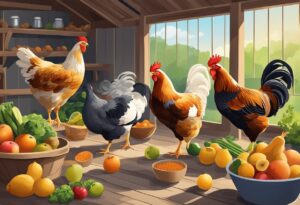
Providing adequate vitamins and minerals improves feed efficiency and reduces disease and mortality risk. This directly influences the profitability and sustainability of poultry operations. Understanding how these nutrients affect layers helps farmers make better decisions about their diet and management.
Careful supplementation ensures hens get what they need even when natural feed ingredients fall short. This can lead to stronger eggs, healthier birds, and a more consistent egg supply, making nutrition a key factor in successful layer management.
Key Takeaways
- Proper vitamin and mineral intake supports layer health and egg quality.
- Balanced nutrition improves feed efficiency and reduces disease risks.
- Supplementation helps maintain consistent production when natural feeds lack nutrients.
The Role of Vitamins and Minerals in Layer Nutrition
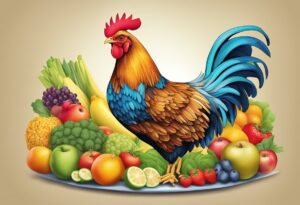
Vitamins and minerals are critical for many biological processes in laying hens. They influence health, productivity, and growth. Proper balance ensures birds function efficiently and maintain high egg quality.
Essential Functions in Poultry Health
Vitamins and minerals support vital bodily functions in layers. For example, vitamins are cofactors in enzyme reactions, helping metabolism run smoothly. Calcium and phosphorus are essential for bone strength and eggshell formation.
Deficiencies can lead to weak bones, poor immune response, and metabolic disorders. Vitamins like A, D, and E help maintain skin, vision, and reproductive health. Minerals like zinc and selenium boost immune function and protect against oxidative stress.
Layers may become more susceptible to disease and lowered vitality without the correct vitamin and mineral levels. This reduces their overall performance and welfare.
Impact on Egg Quality and Production
Egg production depends heavily on the vitamin and mineral supply. Calcium is the most critical mineral for shell strength, preventing breakage. Vitamin D helps regulate calcium absorption. Both are vital to consistent egg-laying.
B vitamins improve energy metabolism, supporting the hen’s productivity. A lack of riboflavin or vitamin B12 can reduce egg output and size. Proper vitamin E intake protects eggs from oxidative damage, improving shelf life.
Mineral deficits lower egg numbers and affect yolk quality and colour. Precise supplementation maximises feed efficiency and egg yield, which benefits economic returns.
Effects on Growth and Development
Vitamins and minerals also influence the growth of young layers before they reach maturity. Adequate nutrition ensures bones and muscles develop correctly, reducing skeletal problems later.
For example, manganese supports cartilage formation, while vitamin K is necessary for blood clotting. Early deficiencies can cause deformities and weak hens that perform poorly as layers.
A balanced diet rich in these nutrients leads to healthier pullets that start laying on time and maintain high production levels. Proper nutrient intake during growth is crucial for long-term flock productivity.
The article on the nutritional significance of vitamins and minerals in poultry provides more details on the functions of vitamins in metabolism.
Key Vitamins Required for Layers
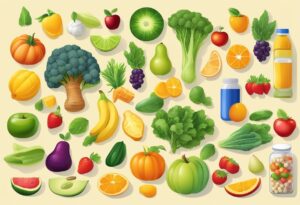
Vitamins play specific roles in the health and productivity of laying hens. They support the immune system, enable proper calcium use for eggshell formation, protect cells from damage, and help convert feed into energy.
Vitamin A and Immune Function
Vitamin A is critical for maintaining a strong immune system in the layers. It supports the health of mucous membranes in the respiratory and digestive tracts, which act as barriers to infection.
It also helps with cell growth and repair, essential for healing wounds or damage caused by disease. A lack of vitamin A can lead to respiratory problems and reduced egg production.
Breeders must ensure their hens get enough vitamin A through fresh green feeds or supplements to keep them healthy and productive.
Vitamin D and Calcium Absorption
Vitamin D is essential for calcium absorption and bone strength in laying hens. Without enough vitamin D, hens cannot properly absorb calcium from their diet, which weakens bones and eggshells.
Strong eggshells depend on adequate calcium levels, which vitamin D helps regulate. Deficiencies can cause soft or thin eggshells and increase the risk of bone fractures.
Sunlight exposure helps hens produce vitamin D naturally, but supplements are often necessary, especially in indoor or winter conditions.
Vitamin E and Antioxidant Defence
Vitamin E acts as an antioxidant in laying hens. It protects cells from damage caused by free radicals, harmful molecules produced during metabolism.
This vitamin supports the immune system and helps maintain muscle function. A deficiency can lead to muscle weakness and increased susceptibility to disease.
Supplementing vitamin E can improve overall health and support the production of high-quality eggs.
B Vitamins and Energy Metabolism
The B vitamins group plays a vital role in energy metabolism in the layers. They help convert carbohydrates, fats, and proteins into usable energy, which fuels all bodily functions.
Key B vitamins for hens include B12, riboflavin, niacin, and pantothenic acid. Deficiencies usually lead to poor growth, decreased egg production, and fatigue.
A balanced diet with sufficient B vitamins ensures hens remain active, healthy, and productive throughout their laying cycle.
For more on essential vitamins for layers, see Nutritional requirements of poultry.
Critical Minerals for Layer Nutrition

Minerals are vital for layers because they support eggshell quality, bone strength, and overall health. Proper mineral balance helps avoid common issues like weak shells, skeletal problems, and poor enzyme activity. Certain trace minerals also work together to maintain the bird’s metabolism.
Calcium and Eggshell Formation
Calcium is the most critical mineral for laying hens. About 95% of an eggshell is calcium carbonate, so hens need enough calcium daily to produce strong, healthy shells.
If hens do not get enough calcium, eggshells become thin, weak, and may break easily. Calcium is stored in the hen’s bones and released during shell formation, especially at night.
Limestone and oyster shells are sources of calcium in feed. Providing free access to these helps maintain consistent calcium levels. Too little calcium lowers productivity, while too much can cause kidney issues.
Phosphorus and Skeletal Health
Phosphorus works closely with calcium for bone development and strength. Both minerals form the hydroxyapatite crystals that make bones dense.
A proper calcium-to-phosphorus ratio (usually around 2:1) is crucial. An imbalance can reduce bone strength or affect calcium absorption.
Phosphorus also supports energy metabolism and is found in grains and supplements. Deficiency may cause brittle bones, poor growth, and reduced egg production.
Magnesium and Enzyme Function
Magnesium is needed for many enzyme reactions in the bird’s body. It helps convert food into energy and supports nervous system health.
Although required in smaller amounts than calcium or phosphorus, magnesium impacts health significantly. It aids muscle and nerve function, which influences egg-laying performance.
Natural feed ingredients like green leafy material and grains provide magnesium. Deficiency is rare but can lead to loss of appetite or weakness.
Trace Minerals and Micronutrient Balance
Trace minerals like zinc, selenium, manganese, and copper are needed in tiny amounts but are critical for immune function, reproduction, and overall metabolism.
- Zinc supports feather growth and wound healing.
- Selenium acts as an antioxidant to protect cells.
- Manganese helps with bone formation and enzyme activation.
- Copper influences iron metabolism and brain function.
Deficiencies can cause weak immune response, poor shell quality, and metabolic disorders.
Balancing these minerals ensures hens remain healthy and productive throughout their laying cycle.
More details on the roles of vitamins and minerals can be found at the Poultry Site.
Balancing Vitamin and Mineral Intake
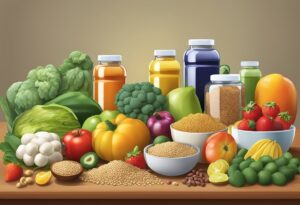
Ensuring layers receive the right amounts of vitamins and minerals is essential for their health and egg production. Both deficiencies and excesses can cause problems, so careful balancing is required. Some nutrients need to be provided in specific amounts while considering their interactions.
Recommended Dietary Requirements
Layers need specific levels of vitamins and minerals daily. For example, calcium is crucial for strong eggshells, while phosphorus supports bone health. Vitamins A, D, and E help growth, immune function, and reproduction.
A typical range includes:
- Calcium: 3.5–4% of the diet
- Phosphorus: 0.35–0.45%
- Vitamin A: 3,000–5,000 IU/kg feed
- Vitamin D3: 1,000–2,000 IU/kg feed
- Vitamin E: 10–20 mg/kg feed
These amounts can vary based on breed, age, and production stage. Supplementation may be necessary when grains and other feed ingredients lack these nutrients, as grains are generally low in essential minerals.
Interactions Between Nutrients
Some vitamins and minerals influence the absorption and function of others. For instance, excess calcium can reduce phosphorus absorption, affecting bone health. Vitamin D3 enhances calcium and phosphorus uptake, making its presence vital.
High levels of one mineral may interfere with others. For example:
- Excess calcium may lower magnesium and zinc absorption
- Too much phosphorus can reduce calcium availability
Balanced intake avoids these adverse effects. Careful formulation ensures nutrients work together correctly, supporting the layers’ overall health and egg quality. Adjusting supplements based on feed analysis helps maintain this balance.
More detailed guidance on nutrient interactions can be found at the UGA Cooperative Extension.
Deficiency Symptoms and Disorders
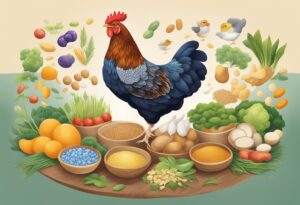
Vitamins and minerals each affect different parts of a hen’s health. Deficiencies can cause visible signs and severe disorders, especially in growing or laying birds.
Signs of Vitamin Deficiencies
Vitamin deficiencies in layers often show up as poor feather quality and slow growth. For example, lacking vitamin B12 reduces feather health and can cause nervous problems.
Vitamin A deficiency may cause weak bones and deformities in birds. Birds might also suffer from eye issues and poor resistance to infections.
Vitamin D is crucial for calcium absorption. Without it, hens develop soft or deformed bones and reduced egg production. These signs point to problems with the bird’s skeletal structure.
Consequences of Mineral Deficiencies
Minerals like calcium and phosphorus are vital for strong bones and eggshell formation.
A Lack of calcium or phosphorus leads to fragile bones and weak or misshapen eggshells. Even if the diet contains some minerals, poor absorption can cause similar issues.
Deficiencies can also result in reduced growth and poor overall body condition. These minerals support many body functions, so their absence directly impacts the bird’s productivity and health.
For more details on mineral problems in poultry, see mineral deficiencies.
Sources of Vitamins and Minerals in Layer Diets
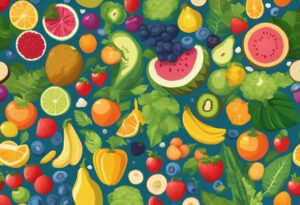
A balanced layer diet includes both natural ingredients and commercial feeds. These sources provide essential vitamins and minerals for egg production, bone health, and overall bird well-being. Understanding how each source contributes to meeting nutritional needs is necessary.
Natural Feed Ingredients
Natural feed ingredients such as grains, seeds, and green plants contain many vitamins and minerals. Green leafy vegetables supply vitamin A and calcium, while whole grains provide some B vitamins and magnesium.
However, the levels of vitamins and minerals in natural feeds can vary widely. Soil quality, plant type, and harvesting methods all affect nutrient content. Natural ingredients alone may not always meet the complete nutritional needs of layers.
Some familiar natural sources of key nutrients include:
- Calcium: crushed oyster shells, limestone, and green plants
- Vitamin D: exposure to sunlight helps synthesise vitamin D in the bird’s skin
- Phosphorus and magnesium: found in cereal grains and legumes
Fortified Commercial Feeds
Fortified commercial feeds are designed to provide precise levels of vitamins and minerals required for laying hens. These feeds often include added calcium, phosphorus, vitamins A, D, E, and minerals such as sodium, potassium, and magnesium.
Using commercial rations ensures consistent nutrient intake, reducing the risk of deficiencies. Most layer feeds are balanced to support both eggshell quality and bird health.
Many commercial feeds also incorporate additives that improve the absorption and availability of nutrients. This makes fortified feeds a reliable choice for backyard or commercial layers.
The Feeding the Laying Hen guide provides more detailed information on feeding laying hens with these feeds.
Practical Feeding Strategies for Optimal Layer Nutrition
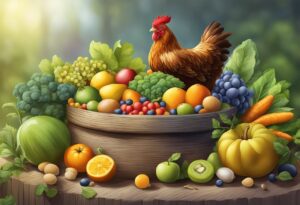
To support healthy egg production, layers need a carefully balanced diet that meets all nutrient requirements. Attention to feed composition and ongoing adjustments ensures hens get the right protein, minerals, and vitamins at every stage.
Feed Formulation and Supplementation
Layer feed should contain about 16-18% protein to support egg formation. It also needs essential minerals like calcium for strong eggshells and phosphorus for bone health. Vitamins A, D, and E are crucial as they support immunity and metabolic processes.
A concentrate feed with 20-23% protein can meet most nutrient needs. Supplementing this with whole grains and a calcium source, like crushed oyster shells, helps balance the diet. Vitamin supplements may be necessary during stress or illness.
Ensuring feed is fresh and appropriately stored prevents nutrient loss. Feeding small amounts multiple times a day encourages better intake and digestion. Providing clean water at all times is equally essential for nutrient absorption.
Monitoring and Adjusting Nutritional Plans
Assessing hen performance regularly helps detect if diet changes are needed. Egg size, shell quality, and laying frequency give clues about nutritional adequacy.
Adjust feeds based on hen age and production stage. Young layers need higher protein, while older hens benefit from more calcium. Seasonal conditions also affect feed requirements.
Tracking feed consumption and body condition ensures hens are neither underfed nor overweight. Adjust rations slowly to avoid digestive issues. Consulting guides like the Practical Feeding Methods for Small Poultry Flocks can improve feed strategies effectively.
Conclusion
Vitamins and minerals are essential for the health and productivity of laying hens. They support key functions like metabolism, immunity, and egg quality. Hens can experience poor growth, lower egg production, and increased disease risk without proper nutrition.
B vitamins and vitamin A help maintain metabolic activities needed for steady laying performance. Vitamins C and E boost the hens’ ability to handle stress and promote overall health and longevity.
Mineral supplements fill gaps in the diet, ensuring hens receive what they need even if the feed is lacking. This helps avoid deficiencies that can negatively affect eggshell strength and hatchability.
A clear focus on optimum vitamin and mineral levels benefits both birds and producers. Enhancing egg yield and quality reduces mortality and improves profitability.
Key nutrients for laying hens include:
- B vitamins for nutrient use
- Vitamin A for metabolism
- Vitamins C and E for stress resistance
- Minerals for shell strength and health
A balanced diet with essential vitamins and minerals supports consistent production and the flock’s well-being. For more details, see the discussion on optimum vitamin nutrition of laying hens.
Frequently Asked Questions
Vitamins like A, D, E, and B-complex are crucial for growth, bone development, and energy metabolism. Minerals such as calcium, phosphorus, and magnesium play a key role in eggshell formation, muscle function, and overall health. Proper nutrition supports immunity and productivity and prevents common deficiencies that affect poultry well-being.
What essential vitamins are necessary for optimal chicken growth?
Vitamin A supports vision, skin, and respiratory health. Vitamin D is vital for calcium absorption and bone strength. B vitamins, including riboflavin and niacin, aid energy production and growth.
How do minerals influence the nutritional well-being of poultry?
Calcium is essential for strong eggshells and skeletal health. Phosphorus works with calcium to maintain bone structure. Trace minerals like zinc and manganese assist enzyme function and immune response.
What are the nutritional requirements for egg-laying hens?
Laying hens need increased calcium for eggshell quality. Balanced vitamins and minerals are required for egg production, feed efficiency, and layer health. Deficiency in key nutrients can reduce egg size and shell strength.
Which vitamins support the immune system of chickens?
Vitamins A, E, and C enhance a chicken’s immune defence. They help protect against infections and support recovery from illness.
What are the consequences of a nutritional deficiency in layers?
Deficiencies can cause poor growth, weak bones, low egg production, and increased susceptibility to disease. For example, inadequate calcium leads to thin or brittle eggshells.
How does one ensure a balanced diet for poultry to maintain health and productivity?
Feed formulations should combine grains with vitamin and mineral supplements. Regular diet quality assessment is necessary to meet the specific needs of layers and prevent common nutritional gaps. Proper supplementation improves feed efficiency and egg quality, supporting sustainable poultry farming practices. More information is available on poultry feed frequently asked questions.

I don’t think the title of your article matches the content lol. Just kidding, mainly because I had some doubts after reading the article. https://www.binance.info/cs/register?ref=S5H7X3LP